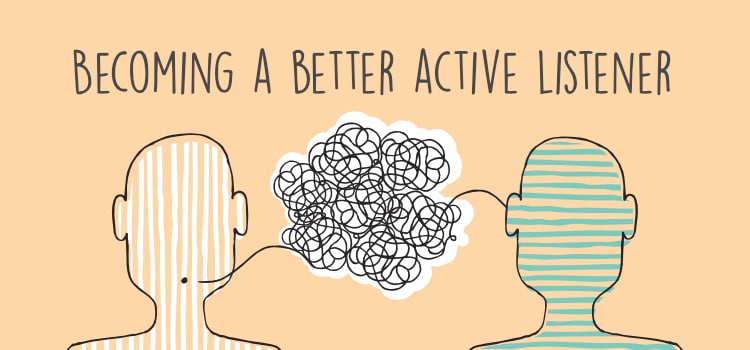After surveying thousands of people for over 15 years, researchers concluded that there are only two attributes that make a leader stand out. The first and foremost attribute is active listening.
But the question arises that why is it the rarest and powerful practice among leaders?
Listening pops up as the rarest and exceptionally powerful gift of extraordinary leaders. In this tech-oriented world of smartphones, Zooms, and packed Schedules, there are more obstacles to listening than before. Every splendid conversation initiates with a good listener. An active listener is nearly as attractive as a good talker.
Do you think listening is difficult?
While writing this article, I came across research about how our prefrontal network prioritizes information. Our brain shutdowns other functions to focus on a specific task, including emotional data processing. More task orientation means less empathy. We are forcing our brains to juggle in our high-stress lives. We drop some balls when there is an immense amount of them in the air. Unfortunately, we usually drop the fragile glass ones that create partnership, respect, and trust. Listening is important because it meets most of our basic needs such as accomplishment, belonging, and respect.
One reason why emotional intelligence is important for good listening is that emotional intelligence skills help to deal with stress. It helps us juggle those glass balls, and helps in prioritizing which one to drop when we get to do that. Be it mathematical or emotional, accurate assessment is the key outcome of intelligence. Here are a few promising ways for bringing emotional intelligence forward to become an active listener.
#1 Suspend and Attend
Suspend means dismiss other tasks. This basically means stop internal chatter. Stop thinking of what you are going to say in reply. Attend means noticing or focusing on something. It means not just let the words hit your ear, but understand those words and find out what’s underneath. It’s a great practice to suspend other tasks and attend to who is speaking to you. This makes listening into a literal moment of investment in a relationship. An investment in trust.
#2 Reprioritize
Busyness is the biggest obstacle when it comes to listening. Have you seen the intriguing New York Times opinion about The Busy Trap? That opinion talks about the fact that so many of us complain about being busy, perhaps it is self-imposed. We human beings like being busy and we are addicted to it. However, to become a good listener, it is important to reprioritize your tasks and prefer listening to others when you don’t have comparatively not important things to do.
#3 Engage Imagination and Curiosity
A researcher named Marco Laboboni shared insights in an article on Forbes about the connection between empathy and imagination. You build new neural pathways when you imagine. You create bridges with your imagination. You can enter into a sense of openness and wonder with the combination of imagination and curiosity that lets you hear more than is said. Clearly, you have no idea what the other person is going through, but what you can do is play “what if”.
Ask yourself the following sort of questions:
- “What if I had this problem?”
- “What if she’s uncertain and needs my help?”
- “What if there is a real problem that I’m not seeing?”
#4 Reflect Their Emotions
Reflecting listening is a very effective way of drawing information from the emotions of the speaker. Wait for them to pause after the identification of certain emotions that seem relevant to their message. After that, verbally describe what you are hearing or seeing followed immediately by a statement or question to invite the person to explain their emotions in-depth. Let us have a look at some of the reflective listening statements.
- “Why did you hesitate?”
- “It seems like you are frustrated with this project. Why is that?”
- “You look excited. What’s up?”
#5 Harness Your own Emotions
Do not mindlessly react at the moment when a strong emotion is triggered inside you based on what the other person said. Use your emotion as a cue for developing a genuine question that directly responds to what you are all ears to.
You can use the following sort of responses when offense burns you inside:
- “That’s interesting! What led you to that view?”
- “I am not sure how that applies to our situation. Can you please elaborate more?”
- “Your proposal concerns me based on what you have shared. Are you planning to mitigate [xyz]?”
Listen with Mindfulness
The biggest communication problem is we do not listen to understand, rather we listen to the response. Fortunately, you can train yourself to listen in an emotionally intelligent way. Emotional intelligence can be developed by mulling over conversations but not in an unhealthy protracted way. The ability to listen and deeply engage plays a pivotal role in the maintenance of effective relationships. Yet, many of us rarely take some time out of our busy lives to pace down and take in what others have to say.
It’s completely fine if active listening feels difficult to you at first glance. Similarly developing emotional intelligence, establishing active listening skills, and learning to meditate is a continuous process that unfolds gradually. We can build rapport and forge more meaningful connections by taking small steps in our daily conversations.
Emotional intelligence directly influences our listening capabilities. They both are directly proportional to each other. Improving one will improve the other and vice versa. The best way to improve both emotional intelligence and listening capability requires only one thing – practice. Hence, it would be better to make a point of developing emotional intelligence as it is the most productive way to enhance your listening ability.


